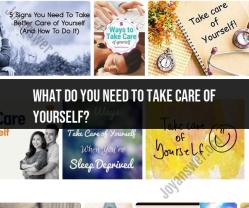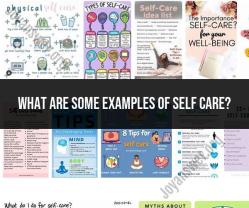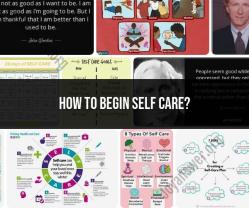What does it mean to really take care of yourself?
To truly take care of yourself means prioritizing your physical, emotional, and mental well-being in a holistic and intentional way. It involves recognizing your needs and nurturing yourself in ways that promote health, happiness, and a balanced life. Here's what it means to genuinely care for yourself:
Self-Compassion: Practicing self-compassion involves treating yourself with the same kindness and understanding that you offer to others. It means acknowledging your imperfections and mistakes without harsh self-criticism and judgment.
Self-Respect: Taking care of yourself means respecting your own boundaries and values. It involves setting healthy boundaries in your personal and professional life and honoring them.
Physical Well-Being: Prioritizing your physical health by eating nutritious foods, getting regular exercise, staying hydrated, and getting enough sleep. It also includes attending to your personal hygiene and overall physical self-care.
Emotional Expression: It means allowing yourself to express your emotions honestly and authentically, whether they are positive or negative. Embracing your emotions and learning to manage them constructively is a part of self-care.
Stress Management: Practicing stress management techniques like mindfulness, deep breathing, and relaxation exercises to reduce the impact of stress on your body and mind.
Mental Stimulation: Engaging in activities that stimulate your mind, challenge your thinking, and provide opportunities for learning and growth. This can include reading, problem-solving, and pursuing intellectual interests.
Balance: Striving for a balanced life that includes work, leisure, and personal time. Balance allows you to avoid burnout and maintain a healthy perspective on life's demands.
Social Connections: Nurturing positive relationships with family and friends and seeking social support when needed. Social connections are essential for emotional well-being.
Gratitude and Positivity: Cultivating a sense of gratitude for the good things in your life and fostering a positive outlook. Focusing on positive aspects can enhance your overall well-being.
Rest and Leisure: Making time for relaxation, leisure activities, and hobbies that bring you joy and fulfillment. Rest and recreation are crucial for recharging and rejuvenating.
Professional Growth: Investing in your career development, seeking opportunities for skill enhancement, and maintaining a healthy work-life balance.
Self-Care Plan: Developing a personalized self-care plan or routine that aligns with your individual needs and values. Your self-care plan can evolve over time as your circumstances change.
Seeking Help: Recognizing when you need professional assistance for mental health challenges or life difficulties and reaching out to therapists, counselors, or medical professionals as needed.
Self-Reflection: Periodically reflecting on your self-care practices and assessing their effectiveness. Being open to making adjustments to your self-care routine as your needs change.
Kindness to Others: Recognizing that self-care also includes extending kindness and support to others. Acts of kindness and generosity can contribute to your own sense of well-being.
Taking care of yourself is not selfish; it's a fundamental aspect of leading a healthy and fulfilling life. It means valuing yourself and acknowledging that your well-being is essential for your ability to navigate life's challenges, nurture relationships, and find joy and meaning in your experiences.
What It Truly Means to Take Care of Yourself
Taking care of yourself means meeting your physical, mental, and emotional needs in a way that allows you to flourish and thrive. It is about making yourself a priority and doing things that are good for you, even when you are busy or stressed.
Self-care is not selfish. It is essential for your well-being. When you take care of yourself, you are better able to take care of others and to live a happy and fulfilling life.
Here are some examples of self-care:
- Getting enough sleep
- Eating a healthy diet
- Exercising regularly
- Managing stress
- Connecting with loved ones
- Doing things that you enjoy
Defining Holistic Self-Care of Mind, Body and Soul
Holistic self-care is a comprehensive approach to self-care that addresses your physical, mental, and emotional needs. It is about taking care of your whole self, not just one aspect of your life.
Here are some examples of holistic self-care activities:
- For the mind: Meditation, yoga, journaling, spending time in nature, reading, learning a new skill
- For the body: Eating a healthy diet, exercising regularly, getting enough sleep, getting regular medical checkups
- For the soul: Spending time with loved ones, doing things that you enjoy, pursuing your passions, connecting with your spirituality
Self-Care vs. Selfishness - Finding Balance in Meeting Your Needs
There is a difference between self-care and selfishness. Selfishness is about putting your own needs before the needs of others without regard for their well-being. Self-care is about taking care of your own needs in a way that allows you to be present for and supportive of others.
It is important to find a balance in meeting your own needs and the needs of others. Here are a few tips:
- Set boundaries. It is okay to say no to things that you don't have time for or that you don't want to do.
- Delegate tasks. If you have too much on your plate, don't be afraid to ask for help from others.
- Communicate your needs. Let your loved ones know what you need from them.
- Make time for yourself. Even if it is just for a few minutes each day, schedule time for self-care activities that you enjoy.
Remember, you cannot pour from an empty cup. When you take care of yourself, you are better able to take care of others and to live a happy and fulfilling life.







